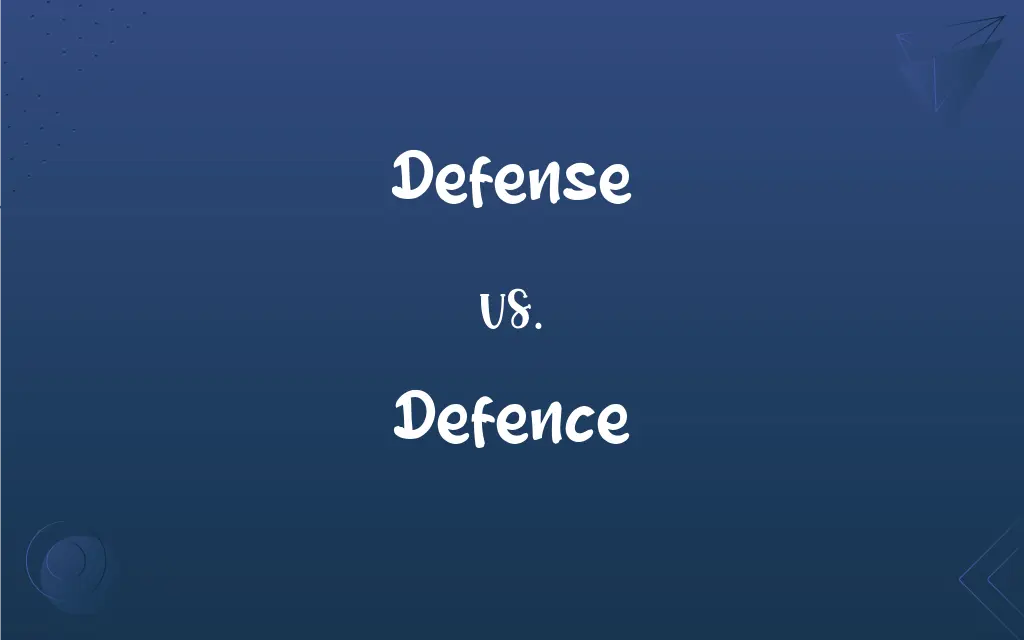Defense vs. Defence: What's the Difference?
Edited by Janet White || By Harlon Moss || Updated on October 16, 2023
"Defense" is the American spelling, while "defence" is the British spelling; both refer to the act of protecting or resisting against harm or attacks.

Key Differences
"Defense" and "defence" represent the same concept but differ in spelling based on regional variations in English. In American English, "defense" is the standard spelling used to denote protection or resistance against threats. Meanwhile, in British English, "defence" serves the identical purpose.
The difference between "defense" and "defence" is purely orthographic. The former is entrenched in American literature, legal documents, sports commentary, and more. In contrast, the latter is entrenched in British contexts, making appearances in similar areas as its American counterpart.
While "defense" is predominantly used in the U.S., one might still occasionally come across the "defence" spelling, especially in older documents or when referencing British sources. Conversely, "defence" dominates in the U.K., but instances of "defense" might emerge, especially with the influence of American media.
Both "defense" and "defence" extend beyond purely military contexts. They can relate to legal proceedings, where a person provides a "defense" or "defence" against accusations. They can also relate to sports, where a team strengthens its "defense" or "defence" to prevent the opposing team from scoring.
Fundamentally, whether one writes "defense" or "defence" hinges on the regional dialect they are employing. It's crucial to maintain consistency within a particular piece of writing, using one form or the other based on the intended audience.
ADVERTISEMENT
Comparison Chart
Regional Usage
American English.
British English.
Meaning
The act of protecting or resisting.
The act of protecting or resisting.
Contextual Appearances
Found in American literature, legal documents, sports.
Found in British literature, legal documents, sports.
Pronunciation
Typically pronounced: dih-FENS.
Typically pronounced: dih-FENS.
Variations
"Defensive" in American English.
"Defensive" in British English.
ADVERTISEMENT
Defense and Defence Definitions
Defense
The act of resisting against danger or harm.
The city strengthened its defense against potential invaders.
Defence
A means or method of guarding or protecting.
The moat was an essential part of the castle's defence.
Defense
A means or method to protect something or someone.
The castle's walls served as a defense against attacks.
Defence
The players and plays aimed at stopping the opposition from scoring in sports.
Their defence prevented the other team from scoring a goal.
Defense
A team's means to prevent the opposing team from scoring in sports.
Their defense is one of the best in the league.
Defence
The act of guarding against harm or danger.
The city's defence mechanisms were unparalleled.
Defense
The case presented by or on behalf of the party being accused or sued in a lawsuit.
His lawyer prepared a strong defense for the trial.
Defence
A response or measure against harmful agents or stimuli.
The body has multiple layers of defence against infections.
Defense
A physiological response to a harmful stimulus.
The body's immune defense is crucial in fighting diseases.
Defence
The justification or denial of an accused party in a legal context.
She provided a solid defence during the court hearing.
Defense
The act of defending against attack, danger, or injury.
Defence
Variant of defense.
Defense
A means or method of defending or protecting.
Defence
The action of defending, of protecting from attack, danger or injury.
FAQs
When should I use "defense"?
Use "defense" when writing in American English.
Can I use "defense" in a British setting?
While "defence" is preferred, "defense" might be understood due to American influence but could be seen as a spelling error.
Are "defense" and "defence" the same in meaning?
Yes, they both refer to the act of protecting or resisting against harm or attacks.
Can I find "defence" in American books or papers?
It's rare but possible, especially in older documents or when referencing British sources.
In sports commentary, do British commentators use "defence" while American commentators use "defense"?
Yes, British commentators typically use "defence" and American commentators use "defense" to describe the players and strategies aimed at preventing scores.
How did the different spellings originate?
The variations are due to historical linguistic developments and standardization processes in American and British English.
Are there any idiomatic expressions that use one spelling over the other?
Idioms tend to reflect regional language use. For instance, Americans might say "the best defense is a good offense," while Brits could say "the best defence is a good offence."
Does the spelling difference extend to other related words like "defensible" or "defender"?
No, words like "defensible" and "defender" are spelled the same in both American and British English.
If I'm writing for an international audience, which spelling should I use?
It depends on your target audience and publication guidelines. However, being consistent in your choice throughout the piece is essential. If unsure, you might specify your choice, e.g., "For this article, I'm using American English spelling."
Are there other differences besides spelling?
No, the difference is purely orthographic; the meanings and applications are the same.
Is the pronunciation different?
Typically, both are pronounced as dih-FENS.
Do dictionaries label one spelling as correct and the other as incorrect?
Dictionaries usually mention both spellings, but they will label one as American and the other as British.
When is "defence" appropriate?
"Defence" is used in British English contexts.
In software or computer security, which term is more commonly used?
"Defense" is common in American-based software, while "defence" might be used in British-based software. However, the global nature of technology means both terms are understood.
In international treaties or conventions, which spelling is used?
It depends on the drafting country or the official language of the document. If it's American English, "defense" would be used, while British English documents would use "defence."
Is one term older than the other?
Both terms have roots in Old French and Latin. The difference in spelling emerged later with linguistic variations in American and British English.
In academic papers, should I stick to one spelling?
Yes, consistency is key in academic writing. Use "defense" for American English papers and "defence" for British English papers.
Do other English dialects, like Australian or Canadian, prefer one spelling over the other?
Canadian English typically uses "defence," similar to British English, while Australian English also leans toward "defence."
Are there derived words that also change based on the spelling?
Yes, for instance, "defensive" remains the same in both American and British English, but its usage aligns with the regional preference for "defense" or "defence."
In legal terms, does "defense" or "defence" have a different meaning?
No, in legal contexts, both refer to the justification or argument of an accused party.
About Author
Written by
Harlon MossHarlon is a seasoned quality moderator and accomplished content writer for Difference Wiki. An alumnus of the prestigious University of California, he earned his degree in Computer Science. Leveraging his academic background, Harlon brings a meticulous and informed perspective to his work, ensuring content accuracy and excellence.
Edited by
Janet WhiteJanet White has been an esteemed writer and blogger for Difference Wiki. Holding a Master's degree in Science and Medical Journalism from the prestigious Boston University, she has consistently demonstrated her expertise and passion for her field. When she's not immersed in her work, Janet relishes her time exercising, delving into a good book, and cherishing moments with friends and family.































































